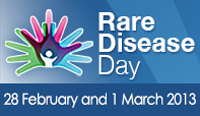Office of Rare Diseases Research
The Office of Rare Diseases Research (ORDR) in the NCATS Office of the Director supports and coordinates rare disease research, responds to research opportunities for rare diseases and provides information on rare diseases. ORDR serves the needs of patients who have any one of the thousands of rare diseases known today. To accomplish this, ORDR coordinates and fosters relationships with a variety of stakeholders, from patient advocacy groups to academic institutions as well as other NIH Institutes and Centers.
Genetic and Rare Diseases Information Center (GARD)
ORDR, in collaboration with the National Human Genome Research Institute, supports GARD, which provides comprehensive information on rare and/or genetic diseases in English and Spanish to patients, their families, health care providers, researchers and the public. In collaboration with GARD, ORDR maintains a database of rare disease information. Results include information from the National Library of Medicine, scientific conferences, support groups, and clinical trials and research.
Rare Diseases Clinical Research Network (RDCRN)
ORDR, in collaboration with eight NIH Institutes (Eunice Kennedy Shriver National Institute of Child Health and Human Development, National Cancer Institute, National Heart, Lung and Blood Institute, National Institute of Allergy and Infectious Diseases, National Institute of Arthritis and Musculoskeletal and Skin Diseases, National Institute of Dental and Craniofacial Research, National Institute of Diabetes and Digestive and Kidney Diseases, and National Institute of Neurological Disorders and Stroke), manages the RDCRN program, which consists of 19 distinct clinical research consortia and one Data Management and Coordinating Center.
The purpose of RDCRN is to facilitate clinical research in rare diseases through support for:
- Collaborative clinical research in rare diseases, including longitudinal studies of individuals with rare diseases, clinical studies, and/or phase I, II and II/III trials.
- Training of clinical investigators in rare diseases research.
- Pilot and demonstration projects.
- Access to information related to rare diseases for basic and clinical researchers, academic and practicing physicians, patients, and the public.
RDCRN serves as a test bed for distributed clinical data management that incorporates novel approaches and technologies for data management, data mining and data sharing across diseases, data types and platforms.
Related Links
- Frequently Asked Questions about Rare and Neglected Diseases
- Genetic and Rare Disease Information Center
- Rare Diseases Research and Clinical Trials
- Rare Disease Workshops

Social Media Links